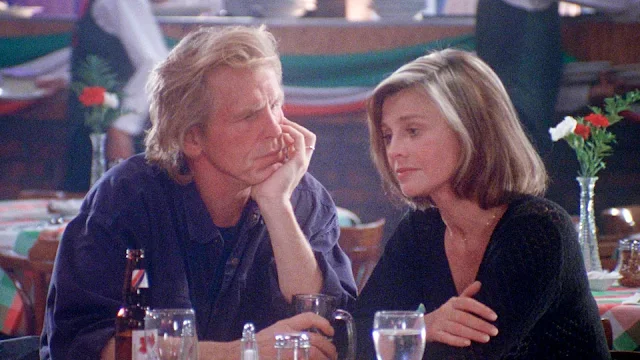 |
| Nick Nolte and Julie Christie in Afterglow |
Cast: Nick Nolte, Julie Christie, Lara Flynn Boyle, Jonny Lee Miller, Jay Underwood, Domini Blythe, Yves Corbeil, Alan Fawcett, Michèle-Barbara Pelletier, France Castel, Genevieve Bissonnette. Screenplay: Alan Rudolph. Cinematography: Toyomichi Kurita. Production design: François Séguin. Film editing: Suzy Elmiger. Music: Mark Isham.
Elliptical to the very end, Alan Rudolph's Afterglow makes the audience do a lot of work sorting out the messy backstories of the two attractive married couples whose lives and problems intersect. Lucky (Nick Nolte) and Phyllis (Julie Christie) are an odd couple to start with: He's a rough-edged handyman, she's a former movie actress. Jeffrey (Jonny Lee Miller) and Marianne (Lara Flynn Boyle) are younger and wealthier: He's an executive in a corporation, she's a lady who lunches. In both cases, the marriages are at a sexual standstill: Phyllis tolerates Lucky's sleeping around with other women, who are often clients for his handyman services, and Jeffrey seems to find all sorts of work-related reasons not to sleep with Marianne, who has decided that she wants to have a baby. We come to find out that Lucky and Phyllis stopped having sex when he discovered that their daughter wasn't fathered by him but by her co-star. In the uproar that followed, their daughter left home, and now they have come to Montreal in search of her. The reason for Jeffrey's lack of interest in Marianne is less explicit, though he may be having doubts about his sexual orientation: His friend Donald (Jay Underwood) seems to be coded as gay, and Jeffrey likes to compliment his secretary, Helene (Domini Blythe), on what she's wearing. The worlds of the two couples collide when Marianne hires Lucky to remodel their apartment. The Montreal setting gives Rudolph an excuse to make a French movie on New World soil, for Afterglow has the kind of sophistication about relationships that we associate with the French but also the sexual mores of this side of the Atlantic. The film's chief virtue is a radiant performance by Julie Christie, which earned her an Oscar nomination, and Nolte is often fun to watch. Unfortunately, Boyle and Miller aren't quite up their standard, so Afterglow often feels unbalanced.








_poster.jpg)
